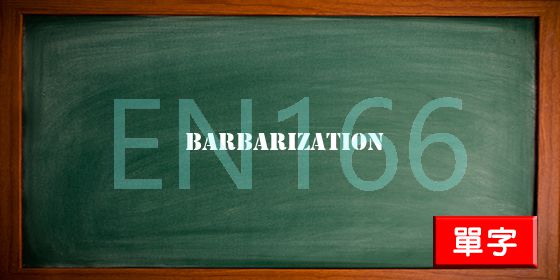barbarization n.1.野蠻化。2.(語文等)不規范化。
n. 1.野蠻化。 2.(語文等)不規范化。 “barbarize“ 中文翻譯: vt.,vi. 1.(使)(人等)變野蠻。 2.(使)(語文)變得不規范,變蕪雜。 “barbarity“ 中文翻譯: n. 1.野蠻行為,殘忍,暴虐,兇猛,粗野。 2.(語文的)不規范,蕪雜。 “barbaro“ 中文翻譯: 巴巴羅; 巴爾巴羅; 巴爾瓦羅; 百寶龍; 鮑爾鮑羅“barbarits“ 中文翻譯: 鮑爾鮑里奇“barbaroan assault“ 中文翻譯: 野蠻人的進攻“barbarito“ 中文翻譯: 巴爾巴里托“barbaroc“ 中文翻譯: 巴爾巴羅克“barbarism“ 中文翻譯: n. 1.野蠻(狀況),未開化;暴虐。 2.(語文的)不純粹,不規范;蕪雜,蕪雜的語句,鄙俗的語句。 “barbarodina“ 中文翻譯: 奇異牙形石屬“barbarising“ 中文翻譯: 用去污粉和沙洗刷木甲板
barbarize |
|
The global scenario group argued that the conventional worlds scenarios are plausible but not guaranteed ; to avoid the risk of barbarization , society should follow the great transitions paths 全球情境模擬小組認為,保守世界看似合理但不保證安全;為了避免野蠻世界的風險,社會應該選擇的是良好轉型的道路。 |

